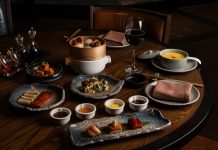Restaurants across Dubai have introduced a wide range of sustainability initiatives, as the city’s diverse culinary landscape makes strides in becoming environmentally responsible – making a difference to staff, customers, and the wider world around them.
Dubai is aiming to send zero waste to landfill by 2030, according to Dubai Municipality’s strategy announced in August last year, and is encouraging innovation in waste management and recycling, which is already being reflected in the work of the food industry. Restaurants are bringing in new employees to eradicate food waste, they are cutting their carbon emissions, and sourcing ingredients more sustainably.
Sustainability is a watch-word across all industries as businesses look to become more environmentally aware, but the food sector has been leading the way for some time now.
There is a growing movement in Dubai making tangible changes and positive impacts, and here are just a few of those businesses and the initiatives they have introduced:
BOCA
BOCA is a perennial favorite in DIFC. With its seasonal menus and farm-to-table concept, this is a restaurant dedicated to championing local ingredients and sustainable sourcing. However, the popular Dubai Food Festival 2022 participant, has now taken things another step further with the introduction of a Waste Officer who will be working alongside current staff to inspect internal wastage, along with suppliers and produce – promising diners their visit to BOCA will result in no more than 15kg of CO2 emissions being produced.

Sofitel Dubai, The Obelisk
The sustainability credentials for Sofitel Dubai, The Obelisk are incredibly impressive. Executive Chef, Russell Impiazzi was finalist in the Sustainability Champion of the Year award at the first Gault&Millau UAE Gala, and has a huge passion for protecting the world around us.
He is passionate about local produce, and ensuring young chefs are educated in sourcing ingredients responsibly. There is also a huge drive to manage food waste at Sofitel Dubai, The Obelisk – highlighted in their partnership with ReLoop. They have contributed to the One Million Saved Meals, Zero Waste initiative, and have seen huge impacts from the changes they have made including another partnership with UAE Foodbanks. Potential waste has been turned into 8,500 meals this year at the property.
Torno Subito
Torno Subito at W Dubai – The Palm has pushed its sustainability beliefs and practices from the moment it opened in Dubai. Massimo Bottura’s passion for tackling climate change and sustainability is evident. The restaurant’s creativity with food which could be potentially wasted is abundant. They turn the likes of day-old bread, mozzarella water, and over ripe tomatoes into the most stunning dishes which not only tantalise the taste buds, but also contribute to the overall sustainability effort.
Hilton Hotels
Globally, Hilton is widely recognised for its environmental and sustainability strategies, and this is echoed by the work being done in Dubai and the UAE. They have an agreement with UAE-based food start-up FreshOnTable to supply local and sustainable food produce across its portfolio of hotels in the country. They have joined with The Water Lab to trial a revolutionary food waste solution which involves composting solutions. The hotel’s educational programmes are impressive too – with the books available for children in a bid to make good habits from an early age in the ongoing fight to protect the world around us.
Folia, Four Seasons Resort at Jumeirah Beach
Staying on the theme of carbon, Folia, has been in operation since 2020 having been founded as a sustainable start-up. They are constantly evolving their operations, and have recently partnered with Tiny Footprint – the world’s first carbon-negative coffee company to source organic and fair-trade coffee.
Waste is a huge focus for restaurants across the city with numerous initiatives aiming at reducing what would previously be thrown away.
Hapi Al Khazzan Park
Diner and ice cream shop, Hapi Al Khazzan Park, has introduced a zero-waste policy to go along with their ethos of sourcing locally. All their cutlery, cups and food tubs are made from corn-starch, while recycled boxes and cutlery are used to package warm food.
Cassette Al Quoz
Minimising food waste has been high on the agenda for Cassette Al Quoz who make sensational dishes out of their offcuts. They also create a bi-weekly menu with these offcuts used in soups, sauces, and syrups. Even their decor fits in with their sustainability goals where possible.
Lowe KOA Canvas
Michelin “Green Star” holders Lowe KOA Canvas, awarded the honour for their sustainability work, not only uses their offcuts in dishes, but also makes packaging out of them too. Their sustainability and giving-back credentials are vast with a focus on reducing waste, sourcing ingredients locally and helping the wider society.
Wild & The Moon Al Serkal Avenue
Plastic-free and with a zero-waste policy is Wild & The Moon Al Serkal Avenue. We know them best for flavoursome raw dishes but delve a little deeper and you’ll find locally and ethically sourced ingredients, along with products which are gluten and additive free, and vegan friendly. Pulp from their juices and nut milk is being turned into crackers, and leftover food sold at a discounted price.
Seva Jumeirah Beach Road
Another plastic free operation is Seva Jumeirah Beach Road. This is a holistic wellness center and vegan café with 100% organic, plant-based dishes which are better for the environment. They are also working towards becoming a zero-waste establishment.
Sanderson’s Café Al Khawaneej
When talking about waste, it is not just food being focused on. Sanderson’s Café Al Khawaneej supports local suppliers, but also recycles all of its oil, while waste water is cleaned and then reused within the community to water plants.
Reif Japanese Kushiyaki Dar Wasl Mall
Innovation is at the forefront of sustainability developments at Reif Japanese Kushiyaki Dar Wasl Mall. Look at their staff uniforms and you might think they are pretty smart, but what is remarkable about them is they are all made from recycled plastic bottles. These Japanese street food masters, another popular Dubai Food Festival participant, also have a minimal wastage policy, and fill customer’s glass bottles with tap-filtered still or sparkling water, which will, of course, be drunk through a metal straw.
Ahmed Al Khaja, CEO of Dubai Festivals and Retail Establishment (DFRE), said: “The measures in place pertaining to environmental awareness in Dubai are clear, and as a sector, Dubai’s food industry is ahead of the curve. Across the city, we are seeing innovative initiatives which are delivering tangible results. Through improvements to food waste management, the use of plastics, water conservation, and how ingredients are sourced, Dubai’s restaurants are making impressive strides to ensure they are at the forefront of change.”
Restaurants across Dubai are known for exceptional standards and experiences with their incredible selection of gastronomic offerings, but that reach is now much further than the confines of their dining rooms. With society as a whole being more aware of the environmental impacts of its actions, the hospitality sector is leading the way with innovative solutions to problems which can affect us all, with the promise of much more to come in the future.









